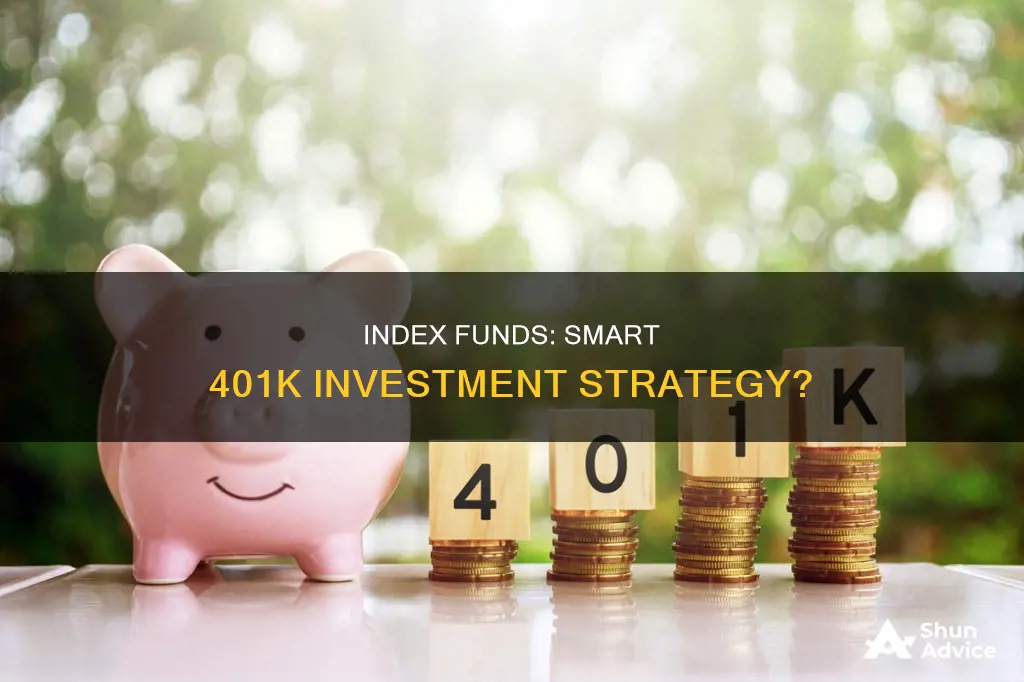
Index funds are a type of hands-off fund that tracks a particular benchmark financial index, such as the S&P 500, Nasdaq or the Dow Jones Industrial Average. They are designed to mimic the performance of these market indexes. They are a passive way to invest in the markets and are a fantastic, low-cost alternative to actively managed funds that are offered through most 401(k)s. Exchange-Traded Funds (ETFs) or Index mutual funds are the most common methods for folks to invest in an index fund. A 401(k) is a type of account that people save for retirement in. It is not an investment but a housing for your investments. This article will discuss the pros and cons of investing your 401(k) in index funds.
| Characteristics | Values |
|---|---|
| Type of investment | Passive |
| Investment strategy | Tracks a particular benchmark financial index (e.g. S&P 500, Nasdaq, Dow Jones Industrial Average) |
| Investment expenses | Low (fund expense ratio typically below 1%) |
| Returns | Historically, index funds have outperformed actively managed funds |
| Investment options | Exchange-Traded Funds (ETFs) or Index mutual funds |
| Tax benefits | Yes |
What You'll Learn

Index funds vs 401(k) accounts
Index funds and 401(k) accounts are both investment vehicles that can be used to save for retirement. However, they have different features and benefits that investors should consider when deciding where to put their money.
Index funds are a type of mutual fund that aims to track the performance of a specific market index, such as the S&P 500. They are passively managed, meaning they aim to match the returns of the index rather than outperform it. This passive management style leads to lower fees and less trading, which has resulted in index funds outperforming most actively managed funds over the long term. Index funds are also generally well-diversified since they own large numbers of stocks, which can help limit downside risk during market lows. Additionally, index funds are widely available to anyone and have no contribution limits, withdrawal restrictions, or requirements to withdraw funds. However, one of the main drawbacks of index funds compared to 401(k) plans is the lack of tax advantages. Investors must use after-tax dollars to purchase index funds and pay taxes on any gains.
On the other hand, 401(k) accounts are tax-advantaged retirement accounts that many employers offer to their workers. Contributions to 401(k) accounts are made with pre-tax dollars, and taxes on the earnings are not due until withdrawals are made during retirement. This provides a current tax benefit and allows more money to be invested during an individual's working years, resulting in greater earnings over time. Additionally, many employers match their employees' contributions to a certain degree, providing an additional source of "free" money for retirement. However, 401(k) plans usually have a limited selection of investments, and investors may have to pay high fees. Another significant downside is the lack of liquidity, as withdrawals cannot be made before the age of 59.5 without incurring a penalty.
In summary, both index funds and 401(k) accounts have their advantages and disadvantages. Index funds offer low fees, wide availability, and diversification but lack the tax benefits of 401(k)s. On the other hand, 401(k)s provide valuable tax advantages and the potential for employer matching contributions but suffer from high fees and limited investment options. Ultimately, the decision to invest in index funds, 401(k) accounts, or a combination of both depends on an individual's financial goals, risk tolerance, and time horizon.
Real Estate Investment Fund: Structuring for Success
You may want to see also

The benefits of index funds
Index funds are a great option for those looking to invest their 401(k)s. They are a lower-cost alternative to actively managed funds and historically perform better. They also offer investors access to a wide range of asset classes, including large-cap, mid-cap, small-cap equities, bonds, treasuries, commodities, and REITs.
One of the main benefits of index funds is their low cost. Every dollar saved in investment expenses is a dollar that can be invested in the markets. Over a long period, even small differences in fees can have a huge effect. For example, a fund with a 0.80% expense ratio could eat up $70,000 more of your returns over 30 years than a fund with a 0.40% expense ratio.
Index funds also tend to outperform actively managed funds. They don't incur the costs of large teams to analyze, trade, and predict market movements, and they don't have marketing or revenue-sharing expenses that can increase the fund's cost. As a result, index funds have lower expense ratios than comparable actively managed funds.
Additionally, index funds offer robust options for long-term investing. They track specific benchmarks, such as the S&P 500, the Russell 2000, or the total US Bond market, which have shown consistent long-term growth. By investing in index funds, you can avoid the risk of picking individual stocks and benefit from the diversification of investing in a broad range of companies.
Warren Buffett, one of the world's most successful stock market investors, endorses index funds as a simple and effective retirement savings strategy. He recommends consistently buying an S&P 500 low-cost index fund, staying the course despite market fluctuations, and taking advantage of the low fees that these funds offer.
In summary, index funds offer a lower-cost, robust, and historically strong-performing alternative to actively managed funds, making them an attractive option for those looking to invest their 401(k)s.
BlackRock Liquidity Fed Fund Insti: Worth the Investment?
You may want to see also

The drawbacks of index funds
Index funds are a popular choice for investors due to their broad array of asset classes, lower costs, and historically better performance when compared to most actively managed funds. However, there are some drawbacks and risks to consider before investing your 401(k) in index funds. Here are some key points to keep in mind:
Limited Control and Flexibility
While index funds offer a diverse range of investments, they may not provide the level of control and flexibility that some investors desire. The funds are designed to track a specific benchmark or index, and investors cannot choose the specific stocks or assets within the fund. This lack of customization may be a drawback for those who want a more hands-on approach to their 401(k) investments.
Potential for Higher Costs
Although index funds are known for their relatively low costs, it is important to carefully evaluate the expense ratios associated with the funds. Even small differences in fees can have a significant impact on your investment returns over time. Compare the expense ratios of the index funds with other investment options to ensure you are getting the best value. Remember that higher costs can compound and result in substantial differences in savings over the long term.
Underperformance Risk
While index funds have historically outperformed actively managed funds, there is no guarantee that they will always do so. It is possible for index funds to underperform the market or their targeted benchmark. Additionally, some actively managed funds may outperform index funds, although this is not always the case. Diversifying your 401(k) investments across different types of funds can help mitigate this risk.
Lack of Active Management
Index funds are passively managed, meaning they are designed to replicate the performance of a specific index rather than actively seeking to outperform the market. This passive approach may be a drawback for investors who prefer a more dynamic investment strategy. Actively managed funds, on the other hand, employ professional fund managers who actively select investments and make strategic decisions to maximize returns. However, it is important to note that actively managed funds typically come with higher fees, and their performance may not always justify the additional cost.
Potential Tax Implications
Investing in index funds through a 401(k) can have tax implications, especially if you contribute over the yearly limit. Contributing over the limit can result in significant tax consequences, including the possibility of being taxed twice on the excess contributions. It is crucial to carefully consider the tax implications of your investment decisions and consult with a tax professional or financial advisor to ensure you understand the potential tax consequences.
Index Funds: Where to Start and What to Know
You may want to see also

The risks of investing in a 401(k)
Investing in a 401(k) can be a great way to save for retirement and take advantage of tax benefits. However, there are some risks involved that you should be aware of before investing. Here are some of the key risks associated with investing in a 401(k):
- Limited investment options: 401(k) plans typically offer a limited range of investment funds to choose from, which can be a disadvantage if you are an experienced investor looking for more diverse options.
- Complex tax implications: The tax advantages of a 401(k) can be complex, and it's important to understand how they will impact your specific situation. For example, traditional 401(k) plans are tax-deductible when you contribute, but you will have to pay taxes on withdrawals during retirement.
- Lack of diversification: While diversification is important to minimize risk, some 401(k) investors may end up with a portfolio that is overly focused on stocks, which can be risky if the market takes a downturn.
- Risk of investment losses: All investments carry the risk of losses, and 401(k) investments are no exception. The stock market can be volatile, and if you invest heavily in stock funds, your portfolio value can fluctuate significantly.
- High fees: Some 401(k) plans may charge high fees that can eat into your investment returns. It's important to carefully review the expense ratios and fees associated with the funds in your 401(k) plan.
- Being too conservative: While taking on too much risk can be dangerous, being too conservative with your investments can also be a risk. If you allocate too much of your portfolio to low-risk assets like bonds, you may not achieve the returns needed to meet your retirement goals.
- Lack of control: With a 401(k), you may not have full control over how your investments are managed, especially if you choose a target-date fund that automatically adjusts its asset allocation over time. This lack of control can be a risk if you want to be more hands-on with your investments.
- Impact of market downturns: If you are close to retirement and the market takes a significant downturn, it can have a devastating effect on your 401(k) balance. This risk is higher if you are heavily invested in stocks, which can be more volatile in the short term.
- Liquidity risk: Money invested in a 401(k) is typically meant for the long term, and early withdrawals may incur penalties. This means that if you need to access your money before retirement, you could face challenges and additional costs.
International Index Funds: Smart Investment or Risky Gamble?
You may want to see also

The tax implications of investing in a 401(k)
The 401(k) is a popular investment vehicle for retirement planning, offering tax advantages to participating individuals. Here are the key tax implications of investing in a 401(k):
Tax-Deferred Contributions
K) plans offer tax-deferred contributions, meaning you don't pay income taxes on the money you contribute to the plan until you withdraw it in retirement. This reduces your taxable income in the year you make the contributions. However, you still need to pay some FICA taxes (Medicare and Social Security) on your payroll contributions.
Taxable Withdrawals
When you withdraw money from your 401(k) during retirement, it is taxed as regular income. The money you take out, also called a "distribution," is taxed at your prevailing income tax rate in the year you make the withdrawal. You can start withdrawing funds from a traditional 401(k) at age 59 1/2 without an early withdrawal penalty.
Early Withdrawal Penalties
If you withdraw funds from your 401(k) before reaching the age of 59 1/2, you will typically incur a 10% early withdrawal penalty, in addition to any applicable income taxes. There are some exceptions to this penalty, such as certain hardship distributions, leaving your job after a certain age, disability, or specific medical expenses.
Required Minimum Distributions (RMDs)
Once you reach a certain age, usually 72 or 73, you are required to start taking RMDs from your 401(k). These are mandatory minimum amounts that you must withdraw each year. If you don't take the required distribution, the IRS can impose a penalty of 50% of the amount that should have been withdrawn.
Employer Matching Contributions
Some employers offer to match your contributions to your 401(k) plan, providing you with additional funds for retirement. This employer match is also tax-deferred, and you won't be taxed on it until you withdraw the funds in retirement.
Tax Benefits for Saving
Contributing to a 401(k) may provide you with additional tax benefits through the Saver's Credit, also known as the Retirement Savings Contributions Credit. This credit directly reduces your tax liability by a portion of the amount you contribute to your 401(k). The credit amount has ranged from $1,000 to $2,000 since its introduction in 2002.
Mutual Funds vs. IRA: Why Opt for Mutual Funds?
You may want to see also
Frequently asked questions
A 401(k) is a type of retirement account that allows you to save and invest for your retirement while offering certain tax benefits. You can choose from a range of investment options within a 401(k) plan, including stock mutual funds, bond mutual funds, target-date funds, and stable value funds. The specific investment options available to you will depend on the plan offered by your employer.
An index fund is a type of investment fund that tracks a specific market index, such as the S&P 500 or the Nasdaq. Index funds are passively managed, aiming to mimic the performance of the market index they track. They are typically low-cost and have outperformed actively managed funds over the long term. By investing your 401(k) in index funds, you can benefit from lower fees and potentially higher returns compared to actively managed funds.
Benefits include lower fees, potential for higher long-term returns, and diversification. However, it's important to consider the risks as well. While index funds have historically performed well, past performance does not guarantee future results. Additionally, it's crucial to assess your risk tolerance and time horizon when deciding how much to invest in stocks versus bonds. Index funds that track the stock market can be volatile, and there is a risk of investment losses. Diversification and understanding your investment options are key to managing these risks.







